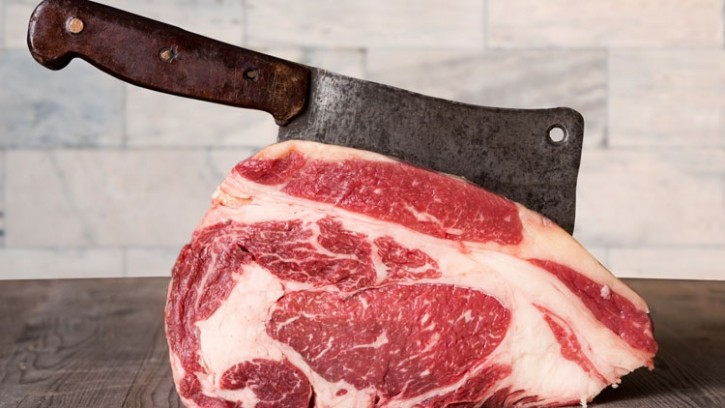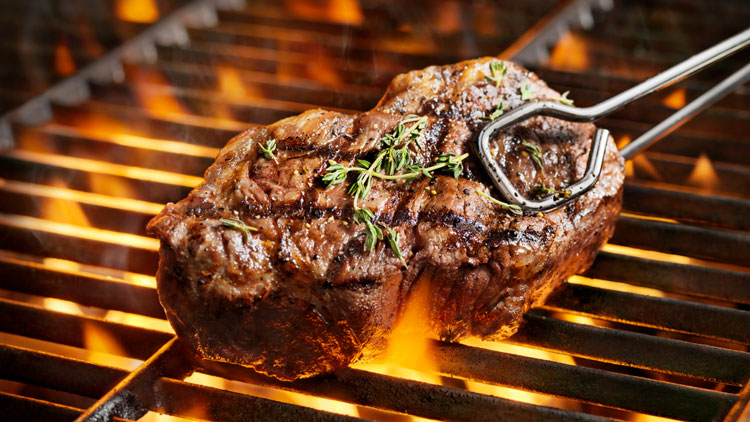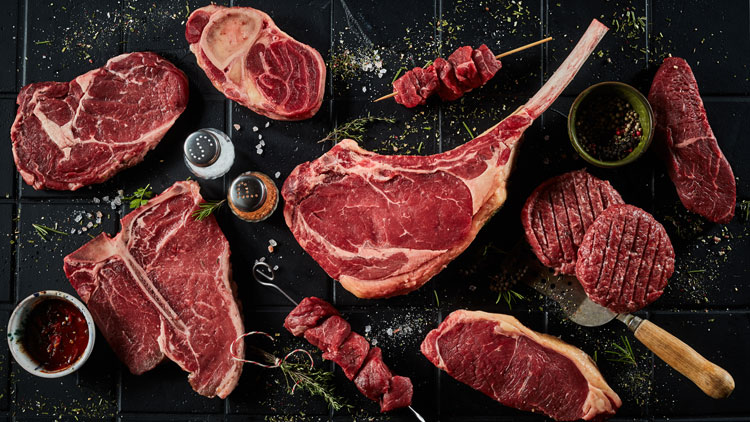roundtable
High steaks: discussing the future of the beef sector

The importance of sustainability
Ioannis Grammenos: Everything we put on our menu is from a sustainable supplier because the guest is very concerned about sustainability. At Heliot Steak House we try and be as sustainable as possible on everything, including electricity, water, and recycling. We educate all our staff on sustainability.
Phil Hutchinson: Sustainability is massively important to us. We are B Corp and we are very protective about that, and it is more than about sustainability. We came to Ireland (Hawksmoor Dublin opened in May 2023) and we are doing more in America (Hawksmoor Chicago will open this year) and finding comparable standards [with the UK] has been a big challenge. Every decision I make from a purchasing point of view is heavily dependent on sustainability. From a beef point of view some of the things we are looking at now is the carbon aspect at farm and abattoir level. We shout so much in the business about how sustainable we are, but our primary product is red meat. There is a lazy agenda that red meat is bad for the planet, but we don’t agree with that so we feel we have to go over the top with how we communicate to our customers and challenge them to ask us how we can be carbon negative.
James Lally: The way my shop runs is all about grass fed, farms that are local, knowing the abattoirs and trying to create that story to help sell products. It becomes a responsibility for us as a business that not only are the farms I’m using practicing amazing animal husbandry but also looking at how they can make steps towards net zero. For my consumers the sustainability part of it is almost something they don’t even register, they are more interested in where the farm is and whether it is grass fed.
Jonny Farrell: I run a small butcher shop in the north, and we source locally to an extent. We deal in grass-fed, whole carcass animals so you’ve got that story, but the story that vegetarians latch onto are the feed lots from America. Those two things are completely non comparable. Here in England talking about sustainability and grass-fed beef is completely different from beef imported from some other countries.
JL: The farming methods in other countries is where a lot of the trouble comes from. It’s very easy to create negative spin on our industry from looking at these other farming methods, which is not how it’s done here. The reason that our meat is more expensive, even for the non-free-range stuff, is because of the hurdles that have to be jumped that don’t exist in some other countries. This is why you can import meat for a lot less than it costs here.
Richie Wilson: We talk a lot about sustainability but more in the seafood restaurant than we do the meat one. But you need to ask the question ‘what’s truly sustainable?’ If the entirety of Britain decides tomorrow that they are only going to eat Irish been then Irish beef is no longer sustainable, so there are different conversations to be had.
Carrie Oliver: I don’t go to steakhouses in the US if they can’t tell me where the meat is from or answer basic questions as to whether there were any growth hormones used. If they can’t answer the questions, I usually order something vegetarian. There’s a group of people who do care but there’s a very large group of people who don’t.
Challenging the vegan movement
JL: The vegan movement is louder than it is in number – they generate a lot of noise, but it doesn’t necessarily mean they have a huge following.
RW: From a beef perspective in the restaurants in Ireland we are getting a very bad rep because vegans and vegetarians are very loud. There is talk about reducing the national herd in Ireland, which worries me as we seem to be a scapegoat. A lot of our beef is reared and slaughtered a few kilometres down the road, so when you think about people eating things such as avocados and rice that is having a much greater impact in terms of sustainability. I really don’t think that the beef industry is being loud enough as a sector to promote that it’s not as bad for the environment as some people say it is.
JL: People almost scared to stick their head out there in case they get it taken off.
Ross Anderson: Unfortunately, social media can be your best friend or your worst enemy and the vegans do have a loud voice. The beef industry is very proud of its product and a lot of effort goes into the sustainability, and yet if you are bringing in wagyu or stuff from New Zealand people jump on it as a negative and it does influence people. British and Irish farmers are working massively to come up to a level of sustainability we can be proud of.
CO: There’s so much data being pushed around about how eating beef is wrong. Breaking through that is a big challenge.
PH: Having spent a lot of time talking to the meat alternative industry they all have one voice; they all point to the feed lot model as the one beef model. This side of the fence there isn’t a clarity of message in what we’re saying or even some soundbites we can get behind that are consistent and that dramatically weakens any counter argument. If the best in class could come together and have one voice, it would be hugely powerful.
Mark Zieg: We don’t want to be saying our beef is more sustainable than anyone else’s, we can only talk for ourselves and say we are measuring it, improving, and putting all these things in place. It goes down into every farm, the DNA, the breeding. It’s still our policy to talk to the trade and journalists but we’re not going to go out and really go heavy at trying to do this with consumers because we’d be out on our own and that’s a dangerous place to be. It’s such a lightning rod with all these [pro vegan] groups out there. It’s something we have to do together. In fairness to the scientific community 1,000 scientists came together last October for The Dublin Declaration and put right all of this misinformation on nutrition, sustainability, the whole lot and that’s really the nub of it. If we all say the same things and scientists stand over it, then we’re in a good place and we’re not going to be caught in the crossfire.
JL: You’ve got to be careful to the degree that you try and educate people [about sustainability]. If you go too in depth, you lose them – they see something flashy on their phone about how bad meat is and that time has been wasted. Just because something is on your doorstep doesn’t mean it is better than something that has travelled, but pushing that message needs to be light and constant.
Matt Owens: The biggest challenge I have is I get chefs from the Middle East and the UK asking why they are going to buy meat from New Zealand because they’ve got great meat next door. And they have. But it’s not always great next door and there are challenges. We can balance out seasonality because people want good steak all year round. The animal husbandry in New Zealand is incredible and antibiotics are banned by the government. We need more education around the sustainability of meat. We all assume a chicken is great because it’s local, but it might have gone out to Thailand and then be flown back. We’re not here to disrupt the market but to support the industry.
The Salt Bae effect
RW: Fair play to Salt Bae, he’s making money but putting £300 steaks on the menu creates a different perception of steak and it becomes something that’s only for the elite. I bought in the wagyu from Japan that won The World Steak Challenge [in 2022]; it cost 135 Euros a kilo and I broke it down to the nth degree to look after my margins. I could have taken the piss and sold the steaks for £180 but it was on the menu at around the same price as my other steaks but in a slightly smaller portion size. I like to give my customers a chance to try it.
RA: The ethos of the restaurant is ‘look where I am’ rather than about the meat someone is eating. A burger covered in gold leaf doesn’t mean it’s a great burger. It’s quite sad for the industry that stuff like that gets so much limelight.
JL: On the one hand getting people looking at steak and saying that’s amazing is great but it also creates a mindset that meat is really expensive, which it isn’t. People come to my shop and say they can’t afford some of my beef but there are so many variables – do you drink alcohol or smoke cigarettes? If so a steak from me might not break the bank. But going to a restaurant and spending £300 on one might. The Salt Bae effect probably does more bad than good.
IG: The meat was there but when the normal consumer went to the restaurant, they knew it was just marketing. They know it’s not real. But it’s great from a marketing point of view.
CO: But if it were real, would it be a problem? I don’t think so. If you think about Screaming Eagle or Opus wine, they significantly changed the Californian wine industry by raising all boats. People might not be able to afford the top ones, but it creates a super-premium category to build from. It can be done really well but not if it’s just smoke and mirrors. If the steaks were significantly different it could help the sector.
MZ: It’s good that we have a guy talking about meat in a positive way than talking about how it’s wrecking the world.
The future
JF: I’m opening my own steakhouse up north and one of the things in the business plan is that it 100% has to be about explaining to customers where the beef comes from. You need to get them to trust you if you want them to spend arguably a lot of money for something they could go to Wetherspoons and get for a lot cheaper.
JL: Restaurants should be made to put where their meat comes from on their menus because I think people should know. Theres a black hole of stuff being sold that not what it’s supposed to be. That doesn’t necessarily just mean beef, it’s across the meat spectrum.
CO: There is an increase in sustainability and buying local in the US, which started in 2008 with the recession where all a sudden people started looking at local butchers. I argue there’s also room for an emphasis on flavour and experience to elevate it like Starbucks did to coffee back when it was growing and talking about the art of the barista. That really changed the coffee industry in the US and Canada and the same can been done for beef. It’s not just about sustainability, or local, but also taste - it’s a combination of all of these.
RW: Five or six years ago I would have said we wanted another five or six steak restaurants, but we would be fearful of that now. We are watching Hawksmoor very closely, not because it’s the competition, Dublin’s a big city, but to see if the demand is still there. A few doors down from us a big chain in Dublin was due to open a very big steakhouse but has now pulled out, maybe because it is of the same mindset as us that we just need to be a bit more cautious. Six years ago, we were looking to open in London, but we are not at the moment.
Round the table
Carrie Oliver, founder, The Oliver Ranch Company
Ioannis Grammenos, executive chef, Heliot Steak House
James Lally, owner, James of Shepperton
Jonny Farrell, owner, Butcher Farrell’s
Mark Zieg, beef sector manager, Bord Bia
Matt Owens, head of culinary, Alliance Group
Phil Hutchinson, head of procurement, Hawksmoor
Richie Wilson, culinary director, FIRE & SOLE Restaurants
Ross Anderson, founder, Roam Catering
Sean Deane, UK meat market specialist, Bord Bia
Stefan Chomka, editor, Restaurant



















